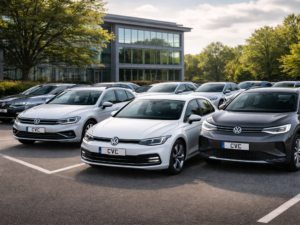In 2024, the UK Government implemented a ZEV (Zero Emissions Vehicle) mandate, which sets targets for the number of fully electric vehicles (EVs) that manufacturers must sell in order to avoid fines. The mandate requires that at least 22% of cars and at least 10% of vans sold by automotive manufacturers in the UK be zero emission. Moreover, these targets increase each year, with the aim of reaching 80% of new cars and 70% of new vans being zero emission by 2030.
This initiative is part of the Government’s efforts to transition to a greener transportation system and reduce carbon emissions. The final target of 100% zero-emission vehicles should be reached by the time the complete ban on petrol and diesel vehicles takes effect in 2035.
However, these targets have posed significant challenges for manufacturers.
Decreasing share of BEVs
The SMMT’s (Society of Motor Manufacturers and Traders) latest market outlook reveals a decreasing share for BEVs (Battery Electric Vehicles) despite overall growth in the new car market. It’s anticipated that less than one in five (19.8%) new cars sold in the UK in 2024 will be electric. This falls well below the 22% benchmark set by the ZEV mandate, highlighting the difficulties in achieving widespread adoption of electric models.
Industry responds to ZEV mandate
The latest sales figures from SMMT indicate that Ford is falling short of the zero emission vehicle targets for both cars and vans. In fact, Ford’s share of all-electric car sales is one of the lowest, with other brands such as Volkswagen, Toyota, Audi, and BMW performing better in this regard. When it comes to electric vans, Ford is also struggling to meet the 10% target for 2024. Renault and Vauxhall, on the other hand, have achieved higher market shares with their EV vans.
Martin Sander, who leads Ford’s European electric vehicles (EV) division, has raised concerns about the ZEV mandate requirements. He admits that Ford’s challenges in meeting the targets might force it to decrease the sales of ICE (Internal Combustion Engine) vehicles in the UK in order to increase its proportion of BEV (Battery Electric Vehicle) sales. He also mentioned that Ford does not intend to pay penalties. Instead, the manufacturer may choose to sell their ICE vehicles elsewhere. However, this could lead to an increase in the prices of Ford’s non-electric cars and vans in the UK.
It’s worth noting that Ford is not the only manufacturer grappling with the targets. Stellantis, the parent company of Vauxhall, Peugeot, and Citroen, has also recently warned of potential sales restrictions in response to the ZEV mandate.
The importance of aligning EV targets with customer demands
Ultimately, the success of the ZEV mandate depends on customers’ willingness to switch to a fully electric van or car. This, on the other hand, is closely linked to adequate charging infrastructure and government support in reducing the cost of purchasing or leasing electric vehicles. Both of these factors could encourage the widespread adoption of electric vehicles. Unfortunately, the elimination of EV grants for cars and the reduction of electric van grants are hindering rather than helping in this regard.
Furthermore, electric vehicle (EV) insurance costs pose another hurdle to switching to EVs. This is primarily because claims for EVs are reported to be 25.5% more expensive than claims for petrol and diesel vehicles. Additionally, the repair process for EVs takes 14% longer, further impacting insurance premiums.
EV uptake driven primarily by business cars
According to the data, the demand for EVs in the UK is primarily driven by businesses’ appetite for electric cars. In fact, only a small proportion (less than one in six) of new battery cars sold last month were purchased by private individuals. This trend can be attributed to the tax benefits associated with purchasing or leasing an electric model directly through a business.
Mike Hawes, the chief executive of the Society of Motor Manufacturers & Traders (SMMT), highlighted the impact of the lack of government incentives for private buyers. Since the Government withdrew the electric car plug-in grant in 2022, private customers are solely responsible for covering the entire cost of purchasing the vehicle. Although manufacturers do offer attractive deals on EVs, they cannot bear the full burden of financing the mass market transition.
In the realm of vans, the adoption of fully electric models in 2024 has declined, with battery electric vans representing a smaller percentage of new LCV registrations compared to the previous year.










